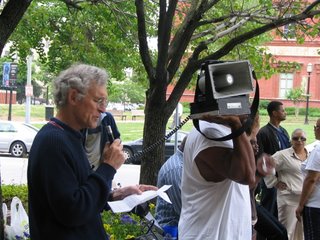If you expand the Washington Metro system in Northern Virginia, you expand the number of trains that run. If you expand the number of trains, you hire more transit workers. If you hire more workers, you facilitate the growth of the Amalgamated Transit Union, local 689, and entrust the functioning of the Northern Virginia economy to its ultra-leftist president Mike Golash.
Virginia is headed down the path of spending $4 billion (before cost overruns) to extend Washington Metro rail service to Tysons Corner and Dulles Airport. And just last week, the House of Delegates leadership proposed dedicating $50 million a year in support of Metro’s capital investment plan. (See “Looking Ahead to the Next Metro Expansion.”) It would behoove lawmakers to learn more about the man whose hand is on the Metro throttle.
Go to the ATW website and you’ll see that the union is interested in a lot more than simply improving the wages and working conditions of its members. States Golosh on the president’s page:
Workers’ real leverage against the bosses lies in their ability to shut down production and call their coworkers into the streets. The threat of economic hardship to the bosses and social instability in society causes a real fear in the bosses’ heart. Direct action by workers is the motor that drives us forward to a better standard of living and a more just society, not election results.
If that doesn’t give you pause about selling your SUV and riding the Metro to work, check out the August/September edition of the ATU newsletter. One article writes about New Orleans in the wake of Hurricane Katrina in the most inflammatory of terms: “It is no coincidence that it is primarily poor black residents that live in the hardest hit areas; slavery and racist laws made sure that the most vulnerable areas of the city are poor black areas.” (Sounds like CNN!) The union also describes the employment of immigrant “guest workers” as “a new kind of slavery.”
Or, how about the article about The Middle East? “People see these fundamentalist groups [like Hezbollah] as taking a stand against U.S. imperialism in the region. … More and more innocent people are dying in these wars for profit and oil. … This is the nature of imperialist war: continuous wars and more innocent people dying. We must fight back against these growing attacks on workers around the world.”
If the rhetoric of class warfare, institutional racism and imperialism sounds almost communist, well that’s because Galosh is, well, a self-avowed communist. Go to the Progressive Labor Party website, where the home page states, “We fight directly for communism.” Check out the July 21, 2004, edition of “The Challenge” newsletter.
WASHINGTON, D.C., June 23 – Progressive Labor Party member Mike Golash has been elected president of the 6,000-member Local 689, Amalgamated Transit Workers Union (ATU). … Amid an imperialist war in Iraq and the rapid rise of a Homeland Security police state, in the face of racist attacks and police terror, and in the shadow of the White House, this local of mainly black workers told the bosses and union hacks, “I’m with Mike!” … Our job is to turn a mass base for a communist into a mass base for communism.
Working at Metro for 28 years, Mike has consistently distributed CHALLENGE to thousands of workers, built a base for PLP, led class struggle and been involved in all union activities, from wildcat strikes to the softball league. … Mike campaigned for ending the racist multi-tier wage progression, militant struggle against management and for international workers’ unity against imperialism.
Who would you rather trust to get Northern Virginians to their jobs every day — Northern Virginians driving their own cars, or members of a left-wing union led by a communist president? Roads don’t go on strike. Transit unions do.
(Hat tip to Ken Reid and Phil Rodokanakis for forwarding the documentation to this story.)


Leave a Reply
You must be logged in to post a comment.